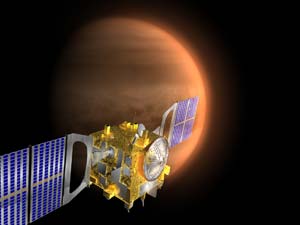 |
Venus Express Spacecraft (Image: Nasa) |
After being launched for 5 months, it is expected that yesterday morning (April 11), Europe’s first Venus probe, named Venus Express, will enter the orbit of this planet, commencing a highly anticipated exploration mission.
Venus Express will study the hot and dusty atmosphere of the planet, aiming to uncover clues about global warming—while also potentially shedding light on changes occurring on this planet.
“We are well aware that greenhouse gas emissions affecting Earth are a topic of significant interest. Through the study of Venus, we can gain a deeper understanding of the atmospheric processes of our Earth,” said Hakan Svedhem from the European Space Agency (ESA).
Scientists hope this mission will help unravel the mysteries of the planet’s dust veil, the dynamics of its atmosphere, and why its temperatures remain scorching hot.
Venus and Earth are quite similar in shape and mass, and share many common materials, yet they have evolved differently over hundreds of millions of years.
Venus is shrouded in thick clouds year-round, and its atmosphere is rich in carbon dioxide and sulfuric acid. These dense clouds trap heat from the Sun, potentially exacerbated by volcanic activity, resulting in surface temperatures consistently around 870 degrees Fahrenheit (466 degrees Celsius), with pressure hundreds of times greater than that on Earth’s surface.
T.VY



















































